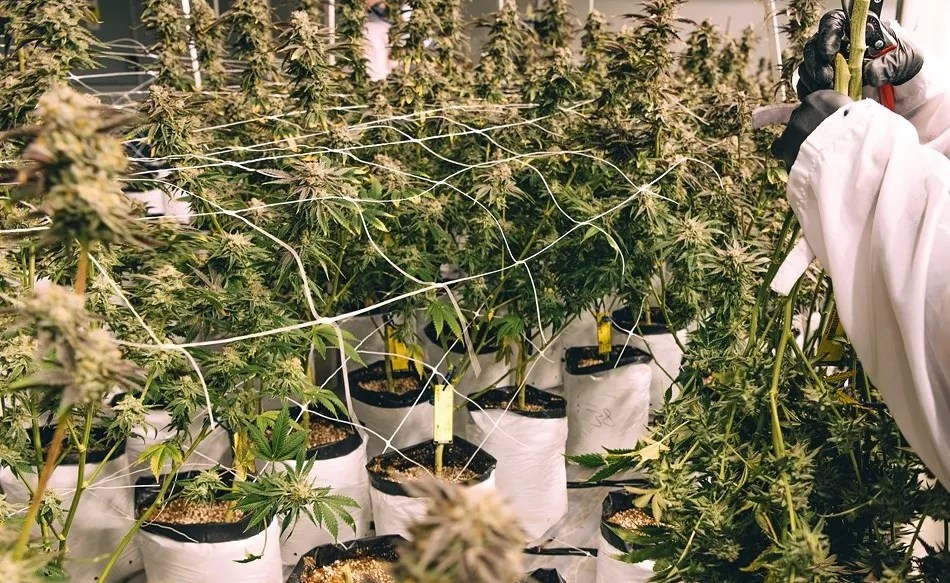
Westword

Audio By Carbonatix
Colorado sales figures and budget predictions show that the marijuana industry’s growth is finally flatlining after COVID-19’s sales boost.
Unlike much of the economy, the cannabis industry largely benefited from the COVID-19 pandemic, with Colorado dispensaries breaking records on their way to nearly $2.2 billion in sales last year. Those strong sales continued into 2021, but as the weather warmed and local gathering restrictions loosened, dispensaries began seeing less action.
After six straight years of annual growth during the months of June, July and August, 2021’s summer pot sales fell in comparison to last year’s, according to state Marijuana Enforcement Division data, and state economists predict more shrinkage ahead. The Governor’s Office of State Planning and Budgeting’s most recent quarterly economic forecast has Colorado marijuana tax revenue falling nearly 6 percent in the 2021-22 fiscal year after “relatively weaker collections than expected in July and August.” Revenue is projected to grow again – albeit at a slower pace – through 2024.
“There was definitely a COVID bump; I think that’s quite clear,” says Truman Bradley, executive director of the Marijuana Industry Group. “It makes perfect sense: All of the bars and concert venues were closed. People couldn’t get together, and there just weren’t a lot of things Coloradans could do.”
Although the governor’s office report says that more data is needed to make any firm conclusions behind the dip, the theory is that in-home pot consumption declined in Colorado in 2021. Outdoor use by residents and tourists increased during the same span, the report adds, pointing to increased sales rates in mountain towns – but that wasn’t enough to counteract the fewer number of people smoking pot at home in Denver.
As CEO of Slang Worldwide, a marijuana holding firm that owns several brands in Colorado, Chris Driessen has to monitor sales trends to position and brand Slang’s subsidiary companies. According to Driessen, the plateau was anticipated by the majority of the pot industry, but it could be more complicated than people getting outside again. Driessen has noticed that lower-cost products have been purchased at higher quantities since 2020, and believes consumers have become more mindful of their spending in the face of income uncertainty.
“People became more mindful of their spending, but they’re spending overall increased because they were consuming more,” he says. “But now people are working from home less. We’re seeing these eviction moratorium and unemployment benefits end, and people are becoming more mindful of their discretionary expenses as they increase their workload.”

Colorado marijuana sales, from 2014 to July 2021.
Colorado Marijuana Enforcement Division
Despite the cool-down, marijuana business owners still have reasons to be optimistic, according to Driessen, who points out that Colorado tourism, a large driver of dispensary sales, still hasn’t fully come back since the pandemic. Bradley sees more potential in the long term after a “very weird” year, as well.
“It’s not going to go up forever, but as people move away from other substances like alcohol, cannabis continues to see growing popularity. The state is growing in population, also, and tourist numbers are usually big for Colorado. I don’t see those three trends slowing down, so I am bullish on cannabis sales,” Bradley predicts.
The marijuana industry is coming back down to earth in the job market, as well. Autumn annually sees a spike in temporary workers to assist in outdoor harvests, but business owners are struggling to fill those positions this year, according to Veridian Staffing, a recruiting agency for marijuana businesses.
Viridian began noticing a growing need for staff in Colorado’s marijuana industry around July, according to CEO Kara Bradford, with a specifically large need in Denver. This has led to a demand for increased wages among marijuana trimmers and harvest workers.
“[Marijuana workers] are popping into hospitality and serving, where they’re not necessarily getting the same hourly rate, but they’re getting a lot of tips. So we’ve talked to some of our clients about considering a bonus on top of hourly wages for employees who do great jobs at harvesting and trimming,” she explains. “We’ve been in an employers’ market for so long, and now we’re running into a situation where people are choosing not to go back to work for a number of reasons, and some workers just moved away during COVID.”
Rural businesses that have a smaller pool of workers in areas with lower costs of living could be impacted even harder. Driessen, who oversees Slang’s partnerships across the state, says he knows of marijuana production facilities in Copper Mountain that shut down in 2021 because of a lack of employees.
The movement toward higher pay is another sign of industry evolution, but also leads to lower profit margins, Bradford explains. Although new to Colorado marijuana, it could be a necessary growing pain for business owners.
“We watch it happen from state to state. I think Washington and Colorado, and to some extent California and Oregon, are all sort of experiencing this shortage. As other markets come online, they go through similar transitions,” she says.